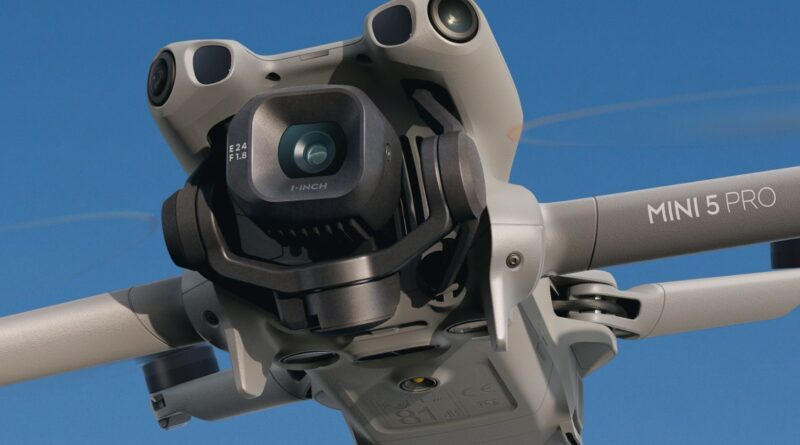The FCC just gave itself the power to make a DJI drone ban stick
This morning, the Federal Communications Commission (FCC) voted 3-0 to let itself retroactively ban gadgets and radio components that it previously approved for entry into the United States, if the company that makes them is deemed a national security risk.
Officially, it’s a way to close loopholes and protect US networks from backdoors in Chinese telecom gear. But it could also give the Trump administration a new way to block Chinese consumer electronics that run on the open airwaves, starting with those from dronemaker DJI, even though the US government hasn’t publicly released evidence that they pose a threat.
On December 23rd, less than two months from today, new DJI products will automatically be banned from import into the US, unless an “appropriate national security agency” proactively vouches that they do not pose a risk to national security. They’ll be banned because those companies will be added to its “Covered List” under the Secure and Trusted Communication Networks Act, which bars the FCC from authorizing their internal radios for use in the US — and without that authorization, it’s illegal to import those items for sale here.
No US security agency has taken up that audit, DJI confirms today. “More than ten months have now passed with no sign that the process has begun,” DJI global policy head Adam Welsh tells The Verge.
He says DJI welcomes an investigation: “As the deadline approaches, we urge the U.S. government to start the mandated review or grant an extension to ensure a fair, evidence-based process that protects American jobs, safety, and innovation.”
Eight months ago, DJI assumed that if the worst came, it wouldn’t be totally banned from the US. “If we were added to the covered list, it’s not retroactive,” Welsh told me in February. “So you’d be in kind of a perverse situation where the current Mavic model would continue to be on sale in the US, but a newer model would be available in Canada and Mexico and everywhere else in the world,” he said.
But it now sounds like the ban could be retroactive, with three important nuances:
- The government says it isn’t taking away your existing DJI gear.
- It’s case-by-case, product-by-product.
- Each time the government wants to retroactively ban a product, the public gets to weigh in.
“We emphasize that we are currently not requiring manufacturers to replace equipment in the hands of consumers,” reads part of a 60-page “fact sheet” that spells out how the new FCC order will work. “[T]he
continued use of such equipment that is already in the hands of users would remain authorized,” it says.
Instead, the new order directs the FCC to conduct a “public interest analysis” for each product, one where it “must give particular weight” to any national security risk posed by the item. Then, the FCC “must provide an opportunity for public comment for a minimum of 30 days,” it says.
While I haven’t seen all that much to suggest DJI poses a greater security risk than any other company selling flying cameras, I can understand why some might be wary of spies in the sky theoretically beaming images back to a company with some ties to the Chinese government even if there’s little evidence for that. (DJI is currently appealing a ruling where a judge allowed the Pentagon to continue calling it a “Chinese Military Company”; the judge was not convinced DJI was actively controlled by the Chinese government.)
If you are among those worried, closing these loopholes makes sense — because DJI has reportedly been erecting numerous shell companies to get ahead of a potential ban. In July, the company would not deny to The Verge that this Skyrover drone was a DJI product in disguise. Three weeks ago, it would not deny to The Verge that these Xtra cameras are disguised DJI products as well.
DJI watcher Konrad Iturbe keeps a running list of supposed “DJI front companies” on this GitHub, most of which have compelling evidence linking their products to DJI in one way or another. On Saturday, he revealed that he finds many of them by scanning FCC records for the unique frequencies used in their OcuSync transmitters, which are responsible for the long-range, low-latency video that gives DJI drones a competitive advantage.
The FCC’s order would let it crack down on these disguised (or legally licensed) DJI products as well — because it can now block a product simply because it contains a DJI radio transmitter, or if DJI was responsible for any of the design or manufacturing of its components. According to the FCC document, “a device would generally be considered to have been produced by an entity if that entity designed, manufactured, assembled, or developed the device.”
It’s possible that DJI might play whack-a-mole with the US government and try to import its products anyhow, but OcuSync’s unique radio signature could make that harder. It would be easier for it to import its cameras that use normal Wi-Fi and Bluetooth, like the excellent and popular Osmo Pocket 3, but they won’t be exempt from a ban.
By default, DJI will have to stop importing all new products that use radio transmitters, not just drones, unless a security agency steps in before the December 23rd deadline.





